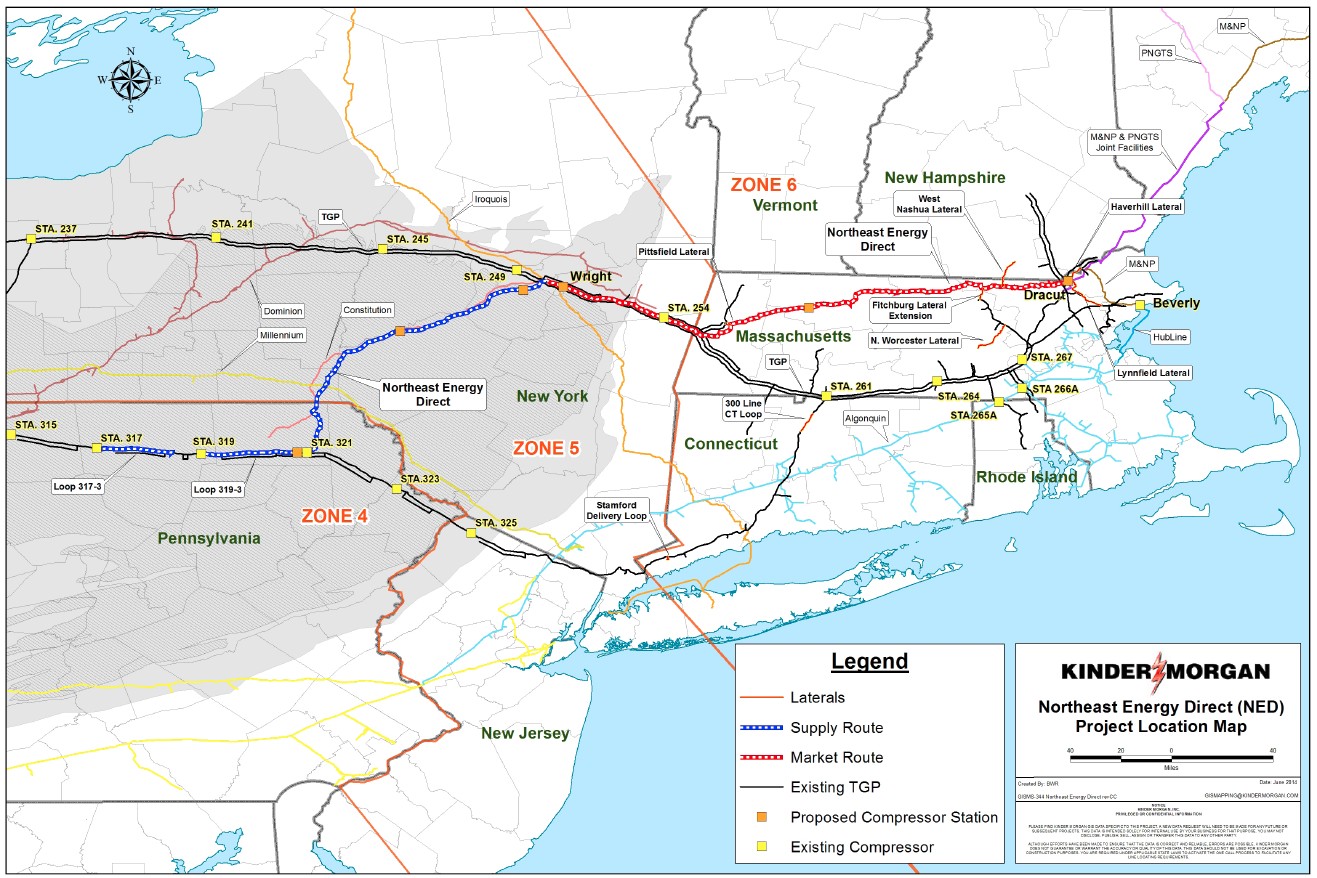July 2015, Vol. 242, No. 7
Projects
Northeast Energy Anchor Shippers Sign On for 500,000 Dth/d of Marcellus Natural Gas

Kinder Morgan announced its subsidiary, Tennessee Gas Pipeline Company (TGP), has finalized its anchor shippers for the market path component of the proposed Northeast Energy Direct Project (NED) following the formal close of the anchor shipper period in February.
Collectively, the anchor shippers have executed agreements to transport approximately 500,000 dekatherms per day (Dth/d) of incremental natural gas supplies sourced from the prolific Marcellus Shale region to meet New England’s growing consumer and industrial gas needs, as well as helping to bolster electric reliability.
NED’s market path component, from Wright, New York, to Dracut, Massachusetts, and beyond, is scalable to 1.2 Bcf/d, or ultimately 2.2 Bcf/d. A project in-service date of November 2018 is planned.
Anchor shippers that have executed binding precedent agreements include: National Grid, 186,963 Dth/d; Liberty Utilities, 115,000 Dth/d; Columbia Gas of Massachusetts, 114,300 Dth/d; and Connecticut Natural Gas Corporation, Southern Connecticut Gas Corporation, The Berkshire Gas Company, The City of Westfield Gas & Electric Light Department and others. TGP is continuing to negotiate with potential shippers on the NED Project, including electric distribution companies (EDCs) and others, and expects to announce additional commitments at a later date.
“Together with our shippers, we have worked hard to develop a regional solution that is a win-win for New England, ” said said KMI East Region Natural Gas Pipelines President Kimberly S. Watson. “Securing anchor shippers provides an important foundation for the successful development of the NED Project.”
Through these commitments to the NED Project, the regional gas utilities in New England are expanding long-standing relationships with Kinder Morgan to serve their growing markets. TGP has provided safe and reliable interstate gas pipeline gas to the New England region for over 60 years and is committed to working with its partners and customers to meet the regional energy needs and challenges, and also taking advantage of the opportunities available through increased access to growing and robust natural gas production.
Kinder Morgan remains keenly aware of the effect that pipeline constraints have on electric prices and reliability in the region and has been actively involved in working to develop a regional solution. According to ISO New England, New Englanders paid an additional $3 billion in electricity costs in the winter of 2013-2014 due to natural gas capacity shortages.
Building on the project’s success being announced today, discussions and efforts are progressing well with gas and electric utilities to work together with Kinder Morgan and other key stakeholders, including regulators and government officials, to address regional issues. Some of these efforts involve a model where EDCs may sign up for pipeline capacity to add gas capacity for power generation in the region. These potential contracts are not yet reflected in the commitments that have been made for the NED Project.
The NED Project brings abundant, low-cost and critically needed incremental regional natural gas supplies to the heart of New England, bypassing infrastructure bottlenecks that result in high energy costs to residents in the region, and it stands to reduce the environmental impacts of burning fuel oil and coal. It provides the potential for gas service to markets where it is unavailable today and for the expansion of local gas service and increased supply options to other pipelines in the region. The project has the ability to provide the necessary volumes needed for EDCs throughout New England.
TGP has over 5,000 megawatts of natural gas-fired generation assets attached to its system, and supplies over 1 Bcf/d of natural gas critical to other intra-regional systems, such as Algonquin Gas Transmission. The NED Project expands TGP’s role as supplier to such systems. By designing the NED Project’s market path to be approximately 90 percent co-located along existing utility corridors, it significantly minimizes the project’s environmental impacts.





Comments